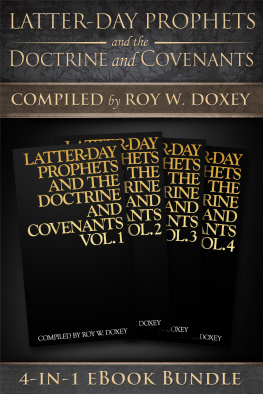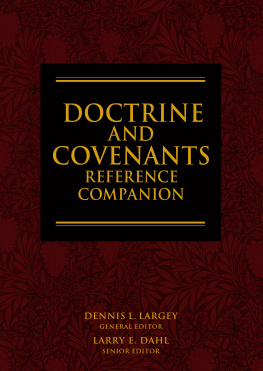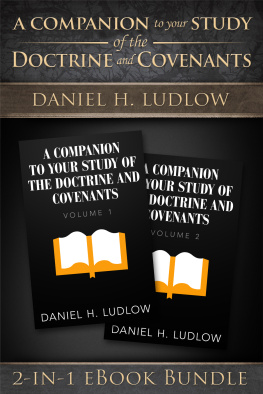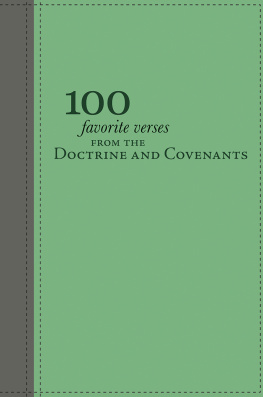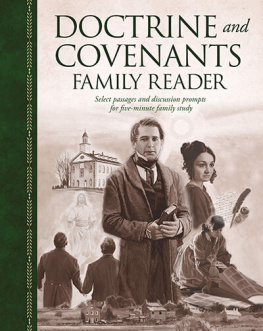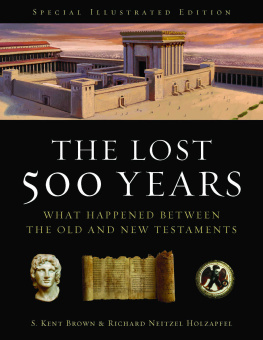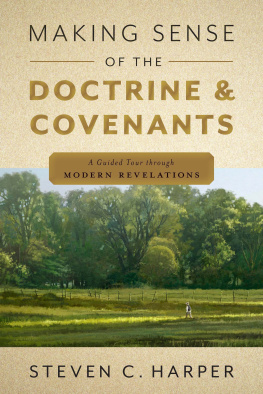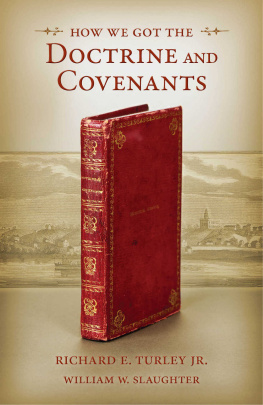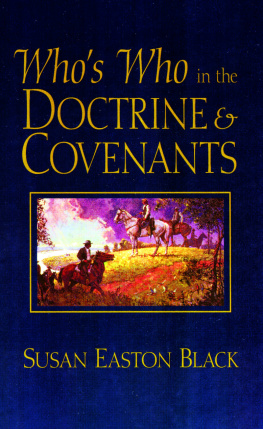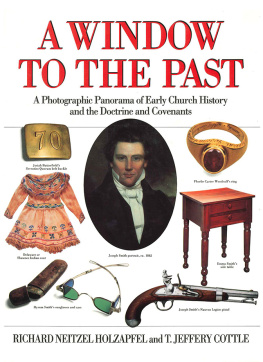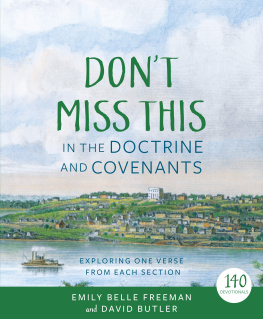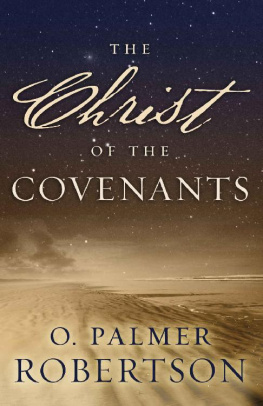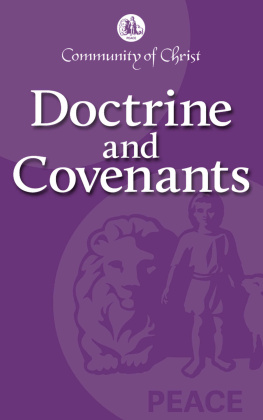Latter-day Prophets and the Doctrine and Covenants 4-in-1 eBook Bundle
Roy W. Doxey
1963 Deseret Book Company.
All rights reserved. No part of this book may be reproduced in any form or by any means without permission in writing from the publisher, Deseret Book Company, P.O. Box 30178, Salt Lake City Utah 84130. This work is not an official publication of The Church of Jesus Christ of Latter-day Saints. The views expressed herein are the responsibility of the author and do not necessarily represent the position of the Church or of Deseret Book. Deseret Book is a registered trademark of Deseret Book Company.
Volume 1
Volume 1
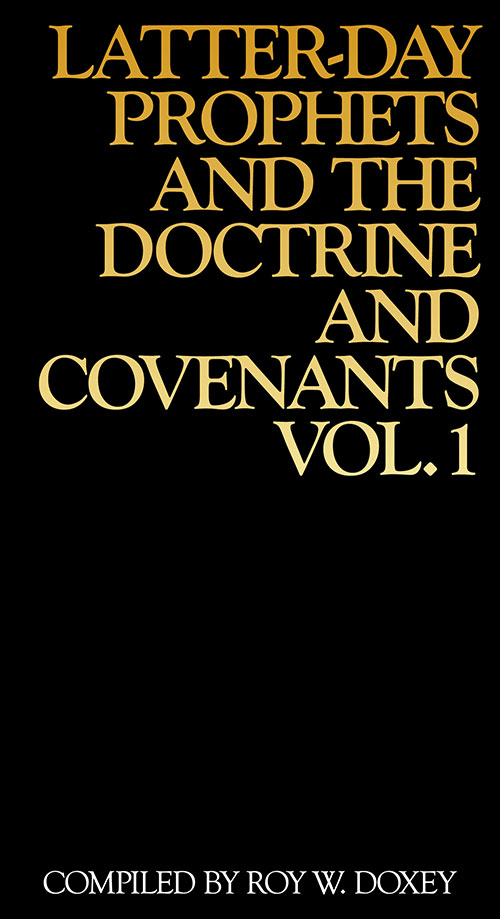
Preface
There are two main reasons that have stimulated me to produce this book. First, many years of study and teaching of the Doctrine and Covenants have convinced me of a conscious need for more Latter-day Saints to become acquainted with this marvelous book of scripture. The second stems out of inspiration received in listening to sermons of the General Authorities in general and stake conferences of the Church, which has also suggested this kind of commentary on the Doctrine and Covenants.
The gospel of Jesus Christ was restored through the Prophet Joseph Smith, and the same keys, powers, authorities, and callings received by him have continued with The Church of Jesus Christ of Latter-day Saints. The power and spirit of the prophets, seers, and revelators of this dispensation, as reflected in their printed works, have attested to this fact and also that the Holy Ghost continues to enlighten and edify the Church as it has done in all ages.
The Lord has declared that scripture is made when his servants are moved upon by the Holy Ghost. Their utterances then become the will, mind, word, voice of the Lord "and the power of God unto salvation." (D&C 68:4.) It is the inspiring power of the Holy Ghost that carries the words of scripture into the hearts of the listener or reader. (2 Nephi 33:1-2.) These truths and the blessings received from heeding the inspiration of the Spirit are stated in the following revelation:
Therefore, why is it that ye cannot understand and know, that he that receiveth the word by the Spirit of truth receiveth it as it is preached by the Spirit of truth?
Wherefore, he that preacheth and he that receiveth, understand one other, and both are edified and rejoice together.
And that which doth not edify is not of God, and is darkness.
That which is of God is light; and he that receiveth light, and continueth in God, receiveth more light; and that light groweth brighter and brighter until the perfect day. (D&C 50:21-24.)
To what better source may the Latter-day Saints go than to the living oracles for instruction and edification? Although the standard works (Bible, Book of Mormon, Doctrine and Covenants, and Pearl of Great Price) are of great worth in pointing the way to salvation, both in the past and the present, it may be maintained, and rightly so, that one could lose the sacred writings, yet the work of the Lord would continue through the inspired men who are his prophets, seers, and revelators. Hence scripture can be made today the same as in times past, by revelation to living oracles.
In addition to the President of the Church, who actively holds all of the keys and authorities of the priesthood, and only to whom revelation for the Church is given (D&C 28:2; 43:3-7; 90:9, 12-16; 107:8, 65-66, 91-92), the counselors in the First Presidency, the Twelve Apostles, and the Patriarch to the Church are sustained by the members in general and stake conferences as prophets, seers, and revelators. Concerning the members of the Council of the Twelve Apostles, President Joseph Fielding Smith wrote:
Each of the apostles when he is ordained has conferred upon him all the keys and authorities which were given by Joseph Smith to the apostles before his death. These brethren, however, cannot exercise these authorities except when the occasion arises that they come to the presidency. Before that time the powers lie dormant. This is the reason why they are sustained as prophets, seers and revelators in the Church, but there can be but one revelator for the Church at a time [the president of the Church]. (Church History and Modern Revelation, series 2, page 151, 1948.)
President Brigham Young said concerning the calling of an apostle:
Now, brethren, the calling of an Apostle is to build up the kingdom of God in all the world: it is the Apostle that holds the keys of his power, and nobody else. If an Apostle magnifies his calling, he is the word of the Lord to this people all the time, or else he does not magnify his calling;either one or the other.
If he magnifies his calling, his words are the words of eternal life and salvation to those who hearken to them, just as much so as any written revelations contained in these three books (Bible, Book of Mormon, and Doctrine and Covenants). There is nothing contained in these three books that is any more revelation than the words of an Apostle that is magnifying his calling. (Journal of Discourses, 6:282.)
It is apparent that when the Saints require an understanding of the teachings of the gospel, their hearts and ears should be attuned to the words of those who have this calling. Anciently, as today, apostles and prophets were placed in the Church of Jesus Christ to perfect the lives of the Saints through their instruction, and thereby to avoid being shifted about by every teaching or doctrine heard. (Eph. 4:11-14.) Elder Mark E. Petersen of the Council of the Twelve has written:
The solid truth of the gospel is what converts. The scriptures provide that instruction. In order that mankind need not be tossed to and fro with every wind of doctrine, the Lord put in his Church Apostles and prophets as guides for the people. They teach the doctrines of truth. They are inspired men. The Lord guides them that they in turn may guide his people. That is what prophets and Apostles are for. (Your Faith and You, p. 241.)
President Reuben Clark, Jr., well stated the calling of the prophets, seers, and revelators:
It should be in mind that some of the General Authorities have had assigned to them a special calling, they possess a special gift; they are sustained as prophets, seers, and revelators, which gives them a special spiritual endowment in connection with their teaching of the people. They have the right, the power, and authority to declare the mind and will of God to his people, subject to the over-all power and authority of the President of the Church. Others of the General Authorities are not given this special spiritual endowment and authority covering their teaching; they have a resulting limitation, and the resulting limitation upon their power and authority in teaching applies to every other officer and member of the Church, for none of them is spiritually endowed as a prophet, seer, and revelator. Furthermore... the President of the Church has a further and special spiritual endowment in this respect, for he is the Prophet, Seer, and Revelator for the whole Church. (Address to Seminary and Institute faculty, July 7, 1954.)
By abiding the counsel of the General Authorities, the Latter-day Saint fulfills his covenant responsibility in working for the cause of Zion. (D&C 6:6-7; 11:6; 12:6; 14:6.) Otherwise he pollutes the holy ordinances and revelations and will be removed out of his place. (D&C 124:45-46.) The opportunity and obligation of the Saints to sustain the leadership of the Church comes periodically in the appointed conferences. (D&C 20:61-62; 124:143-44.) Regarding this solemn procedure, Elder James E. Talmage said:

